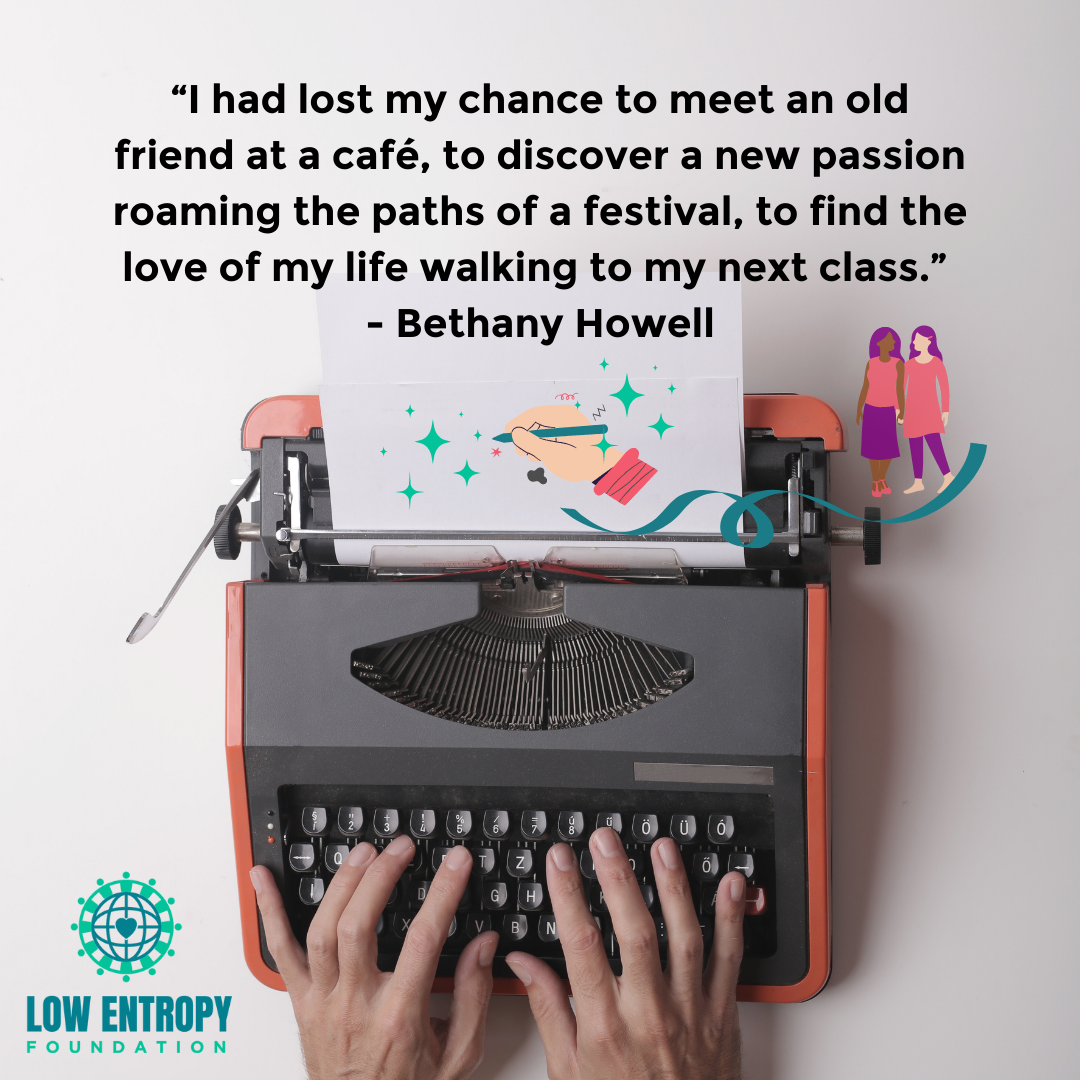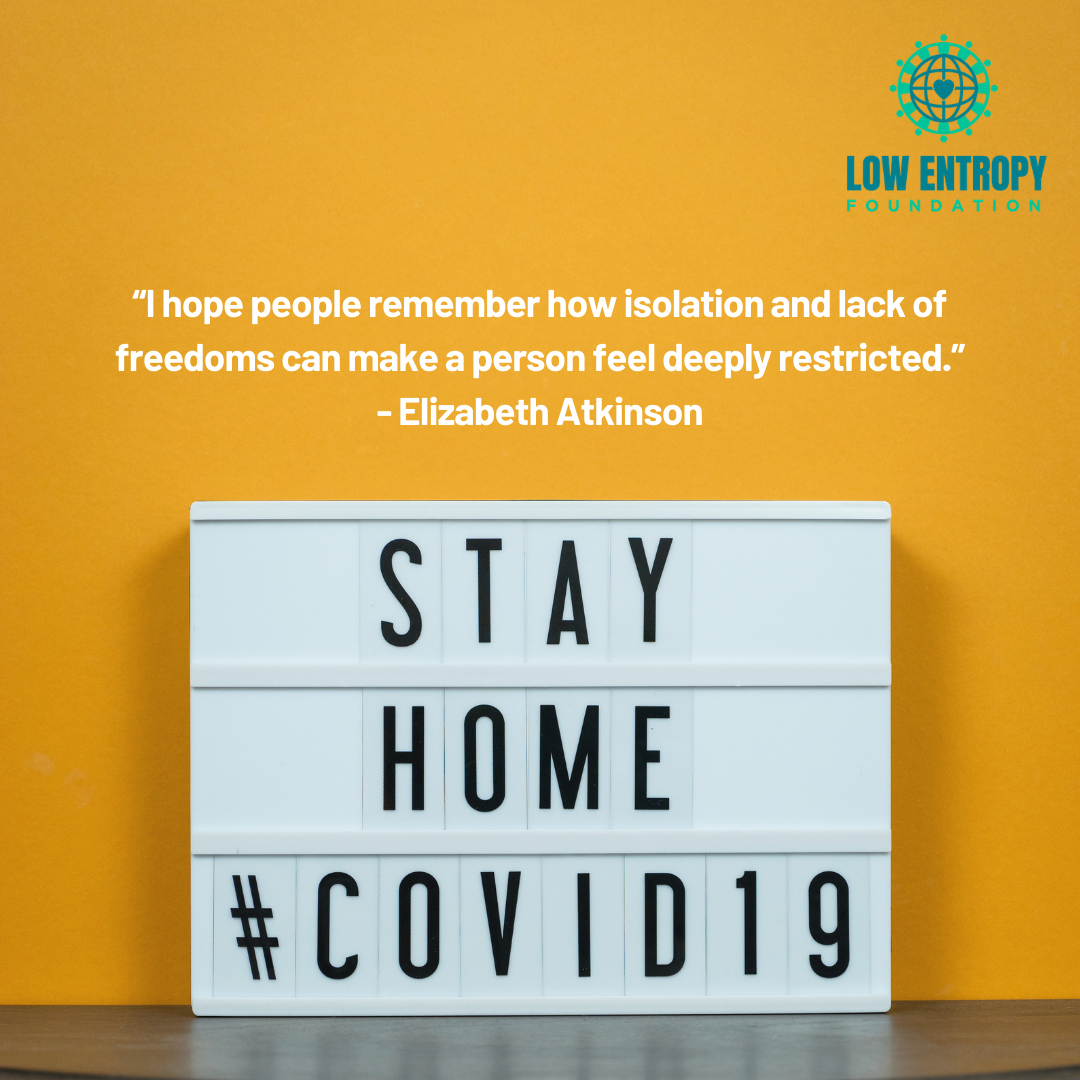Bethany Howell (she/her/hers), Low Entropy Volunteer Writer
COVID-19 stole many things from us. From the great importance of face-to-face contact with loved ones to the simple pleasure of going to the local library, many activities once commonplace were taken away this past year. Even with all of these sacrifices, I would say my greatest personal loss was the beauty of possibility.
I had lost my chance to meet an old friend at a café, to discover a new passion roaming the paths of a festival, to find the love of my life walking to my next class. We all know the old adage “you don’t know what you’ve got ‘til it’s gone,” and yet I never truly felt it until I lost my ability to fantasize about possibilities. I realized quite quickly that I relied on this romanticization of day-to-day life to feel good about myself and my place in the world. I also realized that, with these moments now taken away from me, I would have trouble gaining happiness.
Not only had COVID-19 stolen my life, it had also stolen my hope.
Sometime, after months of – in all honesty – doing nothing productive and wallowing in my own grief, I came to realize that something must change; I had to seize my own form of hope from the world around me, no matter how bleak it appeared through the lens of my depression. I had to find something – anything – that would bring me joy.
This is when I discovered writing. It started out with a few simple poems jotted down in a notes app about what I missed pre-pandemic. This small creative outlet quickly grew to a revival of an old blog account where I could post the emotions I was finally able to put into words. I began to post not just about my life, but also my past. I wrote some poems that I would happily show my parents and others about personal topics that still stung to the touch. No matter what, I wrote poems that I was proud of above all else.
In the middle of 2021, over a year since what I refer to as “The Great Loss of Hope,” I applied for a blog-writing position at Low Entropy. I knew that, if I got in, it would give me the chance to share my writing and, hopefully, use it to help others. I jumped at the chance, eagerly and with the gusto of a child. As you can probably guess, I did end up becoming part of the Low Entropy team.
Many people say that the most difficult part of writing is starting, and I fully agree. That blank page can be daunting, especially when all you allow yourself to create is perfection. Through writing, I discovered how my perfectionistic tendencies have stifled my creativity. My ability to express myself has always been guarded behind those high walls of self-protective instinct, and it took months of private writing to finally break through.
Though I can proudly say that now I am able to write freely, that was not always the case. One small thing I can thank COVID-19 for is giving me the time to experiment freely with myself and my writing; I guess that proves that even the biggest challenges can be used for good.
I cannot, in good conscience, say that writing completely solved my problems, as I still find myself reminiscing on the past instead of living in the moment; however, I can say that it has helped me finally defeat my fear of failure and that, in itself, has brought me a new form of hope. I now have a healthy hope for my future with writing and a hope for my future with Low Entropy.
This post is not meant to be an advertisement to write, nor is it a statement about the therapeutic benefit of creativity (though I can vouch for it!). I have written this as proof to you – and myself – that there is a bit of light at the end of every tunnel, no matter how long and dark it seems.
None of us could have predicted any of this at the start of 2020 and, though it has been quite the ride, I am glad to say that we have made it through and that right there is something of which to be proud.
—
My name is Bethany Howell and I am a third-year university student majoring in psychology and minoring in family and child studies. I have a passion for writing and mental health and my ultimate goal since age 13 has been to make a difference in the world through helping others, which is how I ended up here at Low Entropy!








